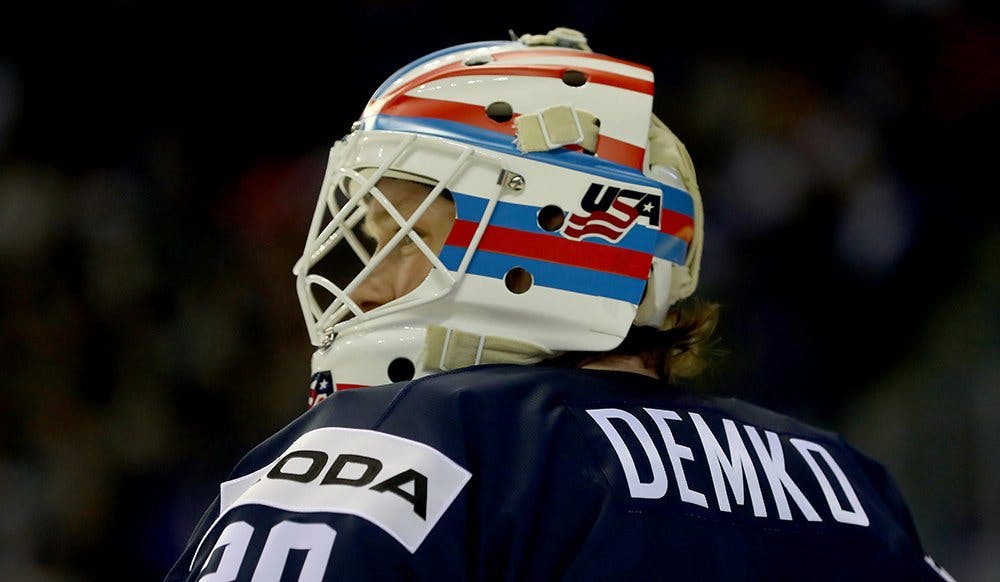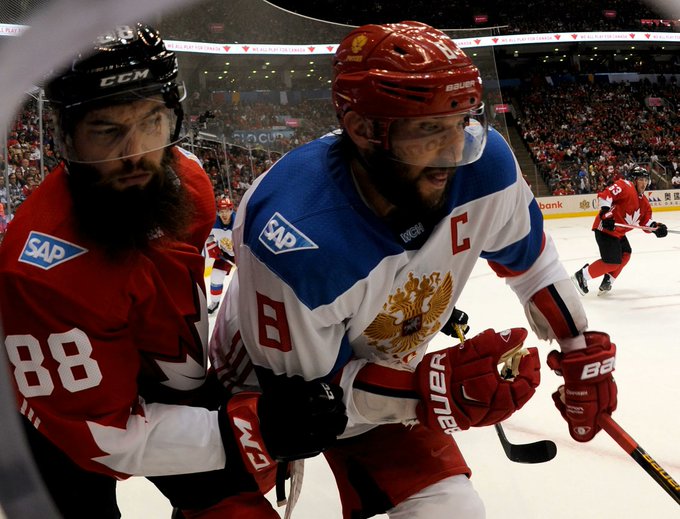From Stockholm: The #NHL/#NHLPA's international tournament in 2025 will not be a World Cup of Hockey. And it won't include Russia or Russian players. More info @DailyFaceoff on the 4-team tournament that they're putting the finishing touches on: dailyfaceoff.com/news/nhls-2025… Show more
Nation Sites
The Nation Network
CanucksArmy has no direct affiliation to the Vancouver Canucks, Canucks Sports & Entertainment, NHL, or NHLPA
Hot take: The NHL and NHLPA’s plans for a 2025 World Cup of Hockey are actually pretty cool

Photo credit: Vancouver Canucks / Twitter
Nov 22, 2023, 12:15 ESTUpdated: Nov 22, 2023, 16:44 EST
The year 2025 seems like a long way off. It sounds like a made-up science-fiction date.
But in reality, 2025 is little more than a year away at this point. Also little more than a year away, if one believes the NHL and NHLPA’s latest announced intentions?
The World Cup of Hockey.
Well, kinda.
As the league and player association’s head honchos were touring Stockholm last week, several of them, like NHLPA President Marty Walsh and NHL Deputy Commissioner Bill Daly, took the opportunity to soft-announce nearly-completed negotiations for a 2025 World Cup of Hockey.
Only it won’t be a World Cup of Hockey the likes of which has been seen before. In fact, it probably won’t even be called the World Cup of Hockey.
As reported by Daily Faceoff’s Frank Seravalli, the current plan calls for an NHL-sponsored international tournament to take place in February 2025.
But this would be an international tournament only in that multiple nations are competing, and not of the variety fans are used to from previous World Cups and Olympic Games. This tournament would only feature four teams: Canada, the United States, Sweden, and Finland.
The proposed format envisions a two-game series between Canada and the US on North American soil and between Sweden and Finland somewhere in Scandinavia, to be followed by a playoff round on either continent.
The reception to this plan, meanwhile, has been just like the expected weather in February 2025: more than a little frosty.
When the NHL and NHLPA last managed to host a World Cup, the year was 2016 and the gimmicks were out in full force. At the time, many — if not the majority of — fans complained about the inclusion of Team North America Under-23 and Team Rest-of-Europe. Others embraced the fun twist, but seven years without a best-on-best tournament since have proven the ultimate folly of those non-traditional teams. As a direct result, we’ve still yet to see the likes of Connor McDavid, Auston Matthews, or Nathan MacKinnon suit up for their own countries in a major event, and that’s a real shame.
At the time, the general sentiment was that the NHL and NHLPA should have avoided the use of gimmick teams and just included more countries in the mix.
So, with the two organizations now pitching a tournament that features even fewer nations involved, the backlash is predictable. It’s been tough to find any positive comments on the as-of-yet-unnamed 2025 tournament, and all too easy to find some variations of “pass” or “not interested.”
But, if you’ll allow us a hot take on the issue, we’ve got to disagree with the nearly-unanimous dissent on this one. Because, so long as we remove the trappings of expectations borne from previous evens, what the NHL and NHLPA are proposing here actually sounds…pretty cool? Specifically, it sounds as though it has the potential to deliver the best international hockey we’ve seen since at least the 2014 Olympics.
Sure, having only four teams involved could be seen as a negative. But for one, it’s at least partially the result of a messy international situation that essentially precludes Russia’s involvement. Calling something an international best-on-best tourney, and then excluding the third- or fourth-best hockey nation, just doesn’t feel right.
Under these circumstances, attempting to limit the participants to a true “best of the rest” could actually be a wise choice. There’s little doubt that Canada, the US, Sweden, and Finland are all a clear-cut step ahead of the likes of Czechia, Slovakia, Germany, and Switzerland. A focus on quality over quantity reduces comparisons to an Olympic-style tournament, reducing the awkwardness of Russia’s absence, and has the potential to greatly heighten the intensity of the play.
Look, series are awesome, and most would agree that they represent the very peak of the sport. The Stanley Cup Playoffs are made up of a sequence of series. The ’72 Summit Series is still talked about as the high-water mark of hockey in Canada.
What really sounds more exciting? A round robin that features matchups of Canada versus Finland, Czechia, Slovakia, and Switzerland?
Or a series that feature Canada versus USA, and then Canada versus USA again, and then maybe Canada versus USA a third time?
Just imagine the stakes. Imagine the tension. Imagine the animosity.
Imagine it not all coming down to a single game, but a series, as hockey should be played.
In fact, if we had our say, we’d take it a step further. Make it a best-of-three series between Canada and the USA and a best-of-three series between Sweden and Finland. Forget the semi-finals. The winners of each series meet in a final, and that’s it.
But the real attraction is the one-v-one series. That’s where the real hockey is going to happen.
Sure, this probably shouldn’t be called an international tournament. It’s not the Olympics, and it’s not the World Cup of Hockey. But that doesn’t mean it doesn’t qualify as best-on-best.
The potential here is staggering. Canucks fans should be able to envision an American team led by Quinn Hughes and his brothers (and potentially featuring all of JT Miller, Thatcher Demko, and maybe even Brock Boeser) facing off against Canada’s best in two-or-three spirited games, and then flying across the ocean to face Elias Pettersson in the finals.
We won’t lie, though: we’re not really thinking about Pettersson and the Swedes all that much as we build hype for the tournament. Really, it’s all about that Canada versus USA matchup. Here, women’s hockey has it right. Canada and the United States are the two best nations in hockey, hands down. Therefore, “best-on-best” really means Canada and the United States playing each other as often as possible.
The Canadian women and American women can’t stand one another. They’re genuine rivals. There’s real feeling there.
Imagine the same thing emerging on the men’s side from a hard-fought series, as so many other rivalries have been wrought in the past.
Sure, there are plenty of downsides. Players like Leon Draisaitl and Filip Hronek are going to be excluded from the proceedings. All nine fans of the All-Star Game will be sad to see it replaced by this. And those absolutely dead-set on the World Cup being a true “world cup” are never going to be satisfied with anything less than a truly international tournament.
But that’s not what this is, and not what it has to be.
If the NHL and NHLPA are to be believed, NHL players will be returning to the Olympic Games. The plan, for which negotiations seem to be nearly finalized, is for this modified World Cup to take place in February of 2025, to be followed in February of 2026 by NHL participation in the Winter Olympics. That should set off a two-year rotating cycle of World Cups and Olympics for the foreseeable future.
And so, if the Olympics are back on the table, why not transform the World Cup into something entirely different?
The World Cup has taken the form of an Olympic imitation. It’s tried to distinguish itself with gimmicky teams. Neither has done much to establish the tournament in the hearts and minds of fans.
This is the way. By boiling the tournament down to the true four best teams (Russia notwithstanding) and taking advantage of hockey’s natural proclivity toward heightened drama via series, the 2025 Non-World Cup has the potential to produce the best best-on-best hockey we’ve seen in the last several decades.
Maybe ever.
This isn’t the Olympics. It’s something different. Something that could be great.
If the goal is to produce a tournament in which everyone feels included and nostalgic but that mostly features one-and-done matchups of little consequence, the NHL is on the wrong track.
But if the goal is to produce the best hockey possible in order to showcase and grow the game, the NHL is decidedly on the right track.
And we know which of those two outcomes we’re cheering for.
Breaking News
- Scenes from practice: Boeser in non-contact jersey as Canucks skate at UBC
- CanucksArmy’s complete midseason ranking of the Canucks’ top 15 prospects
- Dreger: An Evander Kane trade this week plausible ‘if not likely’
- 5 reasons to keep watching the 2025-26 Canucks: Wagner’s Weekly
- Did Jonathan Lekkerimäki’s 2025-26 season move him closer to or further from being a full-time Canuck?


